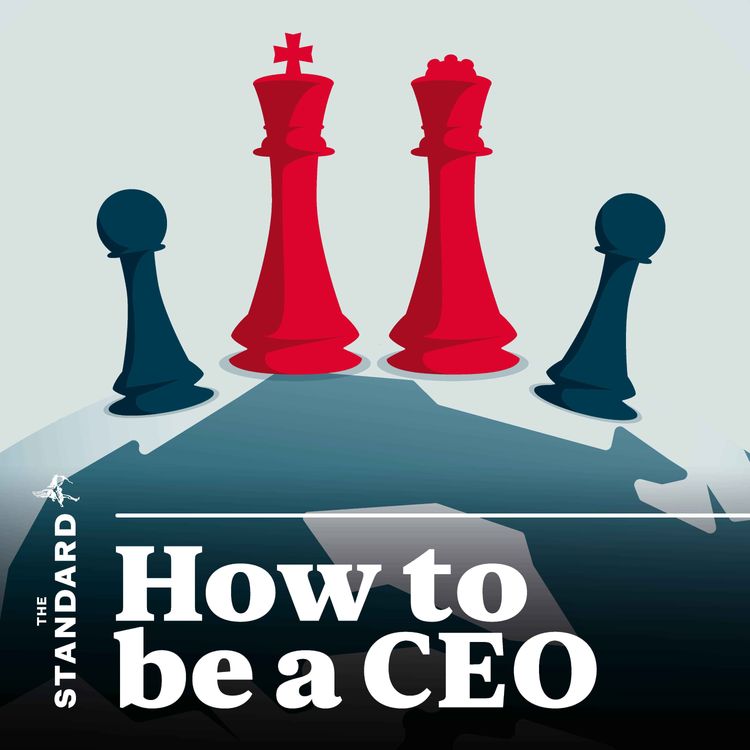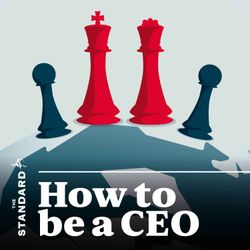Share

How to be a CEO
Tumblr CEO Matt Mullenweg on open-sourcing social media
Season 1, Ep. 74
•
After taking WordPress from a small blogging site in the 2000s to an all-in-one website creation platform, which is now the backbone of around a third of all websites, Matt Mullenweg has now set his sights on social media. Now as CEO of Tumblr, Matt reveals his plans to revamp the site, welcome disillusioned ex-Twitter and Reddit users, and create a social site that is, at its core, open-source. In this episode:
- Matt’s battleplan for making Tumblr better
- How social media sites copy features from competitors
- Where Matt got his nickname as ‘the blog prince’
- How Wordpress took on tech giants like Microsoft, Google & AOL
- Making Tumblr’s algorithm open-source
- How AI will play a role in improving Tumblr
- Is generative AI a concern?
- Can social media actually help people connect?
For more news, interviews and analysis go to standard.co.uk/business.
More episodes
View all episodes

Motorway CEO Tom Leathes on the journey to Unicorn status
23:09||Season 1Tom Leathes is CEO of Motorway, the car buying and selling company that launched in 2017 and secured Unicorn status just four years later, after it was valued at over $1billion.The brand itself has grown rapidly in the UK since it launched, with effective TV and radio marketing campaigns promoting a different way of selling your car.In this episode Tom explains his journey to success with Motorway, reveals his customer-first approach for the business, and discusses the evolving market for used EVs.For more interviews, news and analysis, go to the business page here or pick up the Evening Standard newspaper.
Salesforce CEO Zahra Bahrololoumi on investing in AI
22:48||Season 1Zahra Bahrololoumi is CEO of Salesforce UK & Ireland, dubbed the world's number one customer relationship management software company. The company has committed $4 billion towards AI innovation and growth in the United Kingdom over five years, and it’s building the company’s first AI Centre based in London.Zahra herself has been named one of the best-known female leaders in the UK, and in this episode Zahra discusses how AI is ‘top of the agenda’ for businesses, why more investment is needed in digital skills in the UK, and how hugely talented women in tech can reach the top.For more interviews, news and analysis, go to the business page here or pick up the Evening Standard newspaper.
IBM UK & Ireland CEO Nicola Hodson on the AI revolution in business
20:49||Season 1Nicola Hodson is UK & Ireland CEO of multinational corporation IBM. It is the largest industrial research organisation in the world, and has been making headlines for its computer technology for decades. Today though, the company is firmly in the midst of the AI revolution and Nicola has been put in charge of continuing to push forward their artificial intelligence offering. In this episode Nicola reveals a variety of use-cases for AI today, how they are focused on ethics, and why businesses want to use the technology to help employees and boost productivity.For more interviews, news and analysis, go to the business page here or pick up the Evening Standard newspaper.
Red Carnation Hotels CEO Jonathan Raggett on the evolving hospitality sector
20:30||Season 1Jonathan Raggett is CEO of Red Carnation Hotels, an international hotel group designed to offer guests a luxurious, bespoke experience. It has accommodation in places including the UK, Switzerland and South Africa. In this episode, Jonathan explains his ‘back to the floor’ scheme for managers, and reveals how the business is adapting to new challenges around sustainability, maintaining a good reputation online, and providing the right career pathways for his staff.For more interviews, news and analysis, go to the business page here or pick up the Evening Standard newspaper.
UKHospitality CEO Kate Nicholls on boosting the sector in 2024
18:20||Season 1Kate Nicholls is the CEO of UKHospitality: the lead trade body for the hospitality industry in the UK. It represents more than 750 companies operating around 100,000 venues, in a sector that employs 3.5 million people. In this episode Kate discusses how the sector's still recovering from Covid-19, why a VAT cut is the single best way to boost hospitality right now, and why she hates the term 'staycation'.For more interviews, news and analysis, go to the business page at standard.co.uk/business, or pick up the Evening Standard newspaper.
SME Season: Axa UK & Ireland's Tara Foley on why people are starting small businesses today
12:41||Season 1In this edition of How to be a CEO we’re talking to the boss of AXA UK and Ireland, Tara Foley. She took up the position last year, so there’s lots to talk about there, including what her plans for her first year are. We'll also be looking at their recent survey, looking at who is starting up small businesses right now, and what challenges they're facing.We’ll also be looking at the AXA Start-up Angel competition, which is run in partnership with the Evening Standard and gives budding entrepreneurs the chance to win capital, and get first-class mentoring. There are six opportunities to win, including two top prizes of £25,000 to fund your business idea, and you’ll get mentoring from the AXA Startup Angels along with business insurance for a year. Entries close on June 2nd 2024. For more details, and Ts and Cs, head over to the website.For more interviews, news and analysis, go to the business page at standard.co.uk/business, or pick up the Evening Standard newspaper.
SME Season: Sorting personal money while starting a business
22:33||Season 1On this edition of How to be a CEO, we’re talking to Octopus Money CEO Ruth Handcock to get tips on sorting out your finances when you’re trying to start a business. In this episode, we're talking about:Why people think they’re bad with money, but many aren’t any worse than othersWhy the cost of living crisis “feels like it’s got worse” for many people How to sort your personal finances and start a business at the same timeWhy there are fewer start-ups founded by working class peopleWhy you should take your credit card details off AmazonWhy talking about money is so importantWhy Ruth took the job as CEO of Octopus Money, and what she thinks the job really isWhat she did on day one and how the job’s changed since thenThe value of offering financial advice as a workplace benefitRuth will also be appearing at the Watercooler Event, which is being held alongside the Evening Standard’s SME Expo at Excel London on the 23rd and 24th of April. Tickets are free. Click the links to find out more.
The Apprentice winner Tom Pellereau: how to succeed after the show
21:58||Season 1Continuing our SME season, looking at successful start-ups, we speak with 2011 The Apprentice winner Tom Pellereau, whose business is thriving, 13 years later.Tom’s beauty innovation business Stylideas has made millions since launching in 2012, in part thanks to Lord Alan Sugar’s support and investment.In this episode we talk about:What Tom would have done if he didn’t make it on the showTom reflects on his record as the first Apprentice finalist to lose eight tasks How Lord Sugar has supported Tom’s businessThe impact of the pandemic on StylideasHow Tom has had to adapt to managing peopleTom explains how he deals with copycat productsWhy Tom is focusing on the UK and EuropeTom’s mission to make skin therapy tools more accessibleCan Tom become bigger than James Dyson?For more interviews, news and analysis from the Evening Standard's business team, go to standard.co.uk/business or pick up the newspaper. How to be a CEO is released every second Monday, hit your follow button so you never miss out.
SME Season: Pip Hare Ocean Racing and How to Stay Calm Under Pressure
31:22||Season 1We're continuing our SME season on How to be a CEO with solo round the world sailor Pip Hare. In this episode:Pip's 30 year journey to become a round the globe sailorWhat is “flow state” and how did it help her accomplish her dream?The problems trying to make her way in the sailing world as a young womanThe “knackered old boat” she had to use to sail solo around the worldWhy winning was less important than “outperforming my boat”The importance of keeping perspective on her achievements in times of stressHow to stay calm when your boat breaks down in the middle of the ocean with no-one to helpWhy she’s the ultimate home worker, and the advice she can give to businessesPip’s going to be appearing at the Watercooler, a two day event about workplace wellbeing being held alongside the Evening Standard’s SME Expo on April 23rd and 24th at Excel London. To register and get FREE tickets to the Watercooler go to watercoolerevent.com, and and to learn more about the SME Expo, head to smexpo.co.uk.